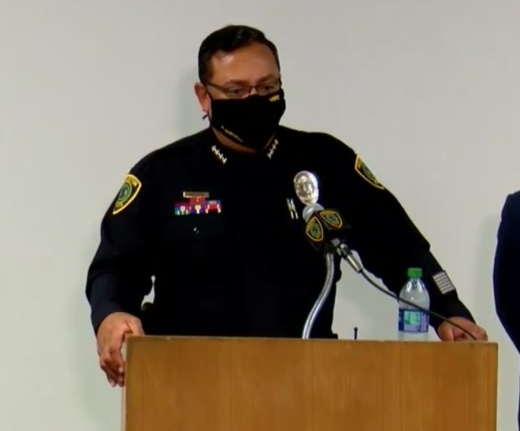The program, detailed in a presentation to Houston City Council’s Public Safety and Homeland Security Committee on Sept. 17, was established as an optional policy for law enforcement agencies across the state by the Texas Legislature. Currently, the Harris County Sheriff’s Office follows the policy.
When the Houston Police Department enacts the policy—the timeline for which is not yet clear—it will mirror the same protocols established in Harris County. It will not be in effect in the parts of Houston that fall within Fort Bend County and Montgomery County.
Certain class A and class B violations will fall under the policy change, such as graffiti, theft totaling less than $750 in value, and driving with an invalid license. The policy does not apply to minors under 17, non-Harris County residents, suspects with outstanding warrants or suspects on parole, among other disqualifications. For possession of small amounts of marijuana, suspects will be directed to the county’s marijuana diversion program instead.
In lieu of jail time, offenders will be offered a citation and will be required to show up in court for sentencing to volunteer hours or an applicable diversion program.
The goal of the policy change, according to David R. Dow, a professor at the University of Houston Law Center, is to divert first-time offenders and those committing minor offenses away from the criminal justice system to free up space in the Harris County Jail as well as to limit the disproportionate effects of the system against people of color, particularly Black people.
“Even a stay as short as a day or two can cost people jobs, cost people time away from their families. ... It's a really important step,” said Chris Harris, director of criminal justice programs at Texas Appleseed.
Council Member Mike Knox, the chair of City Council's public safety committee, is a former Houston police officer. He said he supports the idea as a way to reduce workload on police officers and help keep people from unnecessary interactions with the criminal justice system. He did, however, argue that the policy ought to allow broader discretion in its enforcement so that police officers have greater leeway when determining whether to cite or arrest an offender.
Criminal justice advocates calling into the meeting’s public comment session pushed back on the idea of allowing officers to use individual discretion and instead asked that the policy have strict standards and enforcement mechanisms.
Dow posited that individual actions of police officers that may not be considered racist in isolation can lead to a broader trend of racist outcomes.
“It's precisely because of discretion—whether the individual police officer is racist or not, the discretion gives the opportunity for racist consequences to manifest themselves,” Dow said.
Ray Hunt, secretary of the Houston Police Officers Union, spoke in favor of allowing individual discretion among officers but also advocated for a “warn-and-release” policy that would allow officers to let offenders off without citations at all in some class A and B misdemeanor cases, such as driving with an expired license. Under current state law, Hunt said, officers are only allowed to issue warnings for class C misdemeanors, such as speeding.
“I just think it makes common sense. We can warn anyone on a class C, but we can’t do it on a class A or B,” Hunt said. “We want to have that flexibility. ... We don’t want to take a lady to jail for driving without a license when she’s out trying to buy medicine for her kid.”
A warn-and-release policy would need to be allowed by the Texas Legislature first. Hunt said HPOU is part of an effort to lobby for it.
Editor's note: this post has been updated to clarify the qualifying class A and B misdemeanors.





